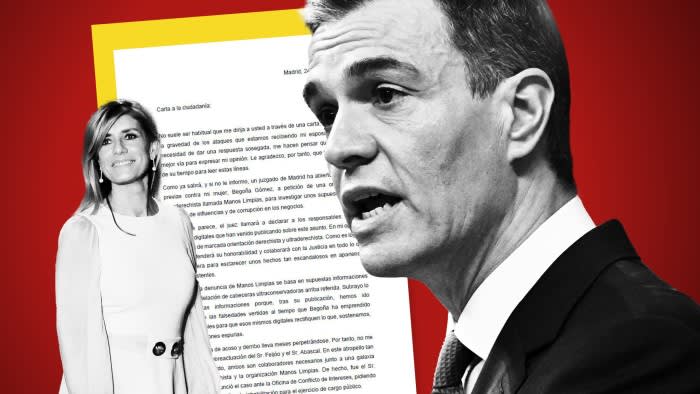Unlock the Editor’s Digest for free
Roula Khalaf, Editor of the FT, selects her favourite stories in this weekly newsletter.
Pedro Sánchez has driven Spain into a frenzy with his bombshell decision to take five days to decide whether he wants to carry on as prime minister. But as the hours tick down to an announcement on his future on Monday, the question is not only whether he will stay or go. It is also whether one of Europe’s canniest political tacticians has succumbed to emotional strain.
A judge’s preliminary investigation into his wife over allegations of influence peddling prompted Sánchez’s extraordinary reaction, which came in the form of an open letter published on Wednesday with the question: “Is it all worth it?”
“There’s a collective state of shock,” said Máriam Martínez-Bascuñán, a political scientist at the Autonomous University of Madrid. “We’re stupefied.”
Two extreme theories about the Socialist prime minister’s decision have emerged, she said, with neither flattering the premier. “It’s either childish narcissism or it’s maximum Machiavellianism.”
Sánchez is regularly described as a ruthless schemer who has led Spain for nearly six years thanks to a series of high-risk gambits to eliminate internal rivals, vanquish opponents and sweet talk voters.
He has been both agent and victim of the coarsening of Spanish politics, where the toxic barbs and collapse of decorum stand out even in a world of ubiquitous polarisation.
But Martínez-Bascuñán said: “It’s so hard to see what he gains from this that it leads me to think that there’s some truth to the idea it was a spontaneous reaction to something that’s broken him down.”
The nature of Sánchez’s letter reinforced the idea. He wrote it alone and it was published only on his personal X account. It did not carry any imprint of the Palace of Moncloa, the prime minister’s office. And it did not read as if it had passed through the calming filters of any editor-advisers.
In it, he presented the investigation into his wife, Begoña Gómez, as the culmination of a years-long “harassment” campaign against him by the opposition People’s party, the far-right Vox party and the rightwing media. The probe was prompted by a complaint from a campaign group founded by a former far-right activist.
“This attack is unprecedented and so serious and so crude that I need to stop and reflect,” he wrote. “I am not ashamed to say that I am a man deeply in love with my wife, who is powerless against the mud they sling at her day after day.”

Others struggled to accept there was no political calculation at play. Toni Roldán, a former centrist MP now at the Esade business school in Madrid, said: “Although I empathise with the situation, given [Sánchez’s] trajectory and the fact he’s a very tough politician, it’s hard to believe that he’s doing this just because he’s emotionally broken.”
One goal could be to take the moral high ground and shame the opposition PP into backing off. But the PP has exhibited no signs of embarrassment. Fulminating against Sánchez, Alberto Núñez Feijóo, PP leader, said: “You do not hijack a nation to put it at the service of Socialist party strategy . . . There is no other European prime minister who has done something like this.”
On Friday, PP operatives circulated a package of press stories about Gómez, covering her alleged dealings with private businesses that received government tenders or public funds. “It’s curious that they say there’s nothing with all this information,” one said. Sánchez described any supposed wrongdoing as “non-existent” in his letter. Gómez has not spoken about the allegations.
Another objective could be to use Sánchez’s period of reflection to highlight the risks of losing him. His aides pointed to the words of Brazilian President Luiz Inácio Lula da Silva, who after speaking to the prime minister wrote on X: “His strength and role are important for his country, for Europe and for the world.”
Sánchez’s own ministers urged him to stay on in public comments. But Pilar Velasco, founder of the Demócrata parliamentary news site, did not see their missives as part of a blitz pre-planned with the premier. “When we see Pedro Sánchez’s ministers sending messages via the media it’s because there is not an internal conversation,” she said.

Notwithstanding his capacity to surprise, Sánchez has three basic options on Monday. He could seek to bolster his position by submitting himself to a confidence vote in parliament. The best he could hope for would be to regroup the seven parties that enabled him to secure another term in office last November. But doing so could yield dividends in Catalan regional elections on May 12 by putting hardline separatists who are part of his shaky national alliance in a difficult position.
The second option is to resign and seek to anoint a new Socialist leader, who would need to be approved as prime minister by the current parliament. If he has already chosen that path, the five days of reflection would really be about “contacting his successor as head of the government and getting everything in order ahead of Monday”, said Pablo Simón, a politics professor at the Universidad Carlos III de Madrid.
Naming Spain’s first female prime minister as his successor would be a point of pride for Sánchez. Obvious candidates include finance minister María Jesús Montero and environment minister Teresa Ribera — both also deputy prime ministers — as well as Pilar Alegría, education minister.
Although Sánchez also has the power to call a general election, the law would not let him do so until the end of May and it could not take place until July.
The third option is to announce that he is staying in power and returning to business as usual. But having taken the country to the edge, doing so would rile Spaniards immensely, Simón said. “It would be monumentally ridiculous.”
